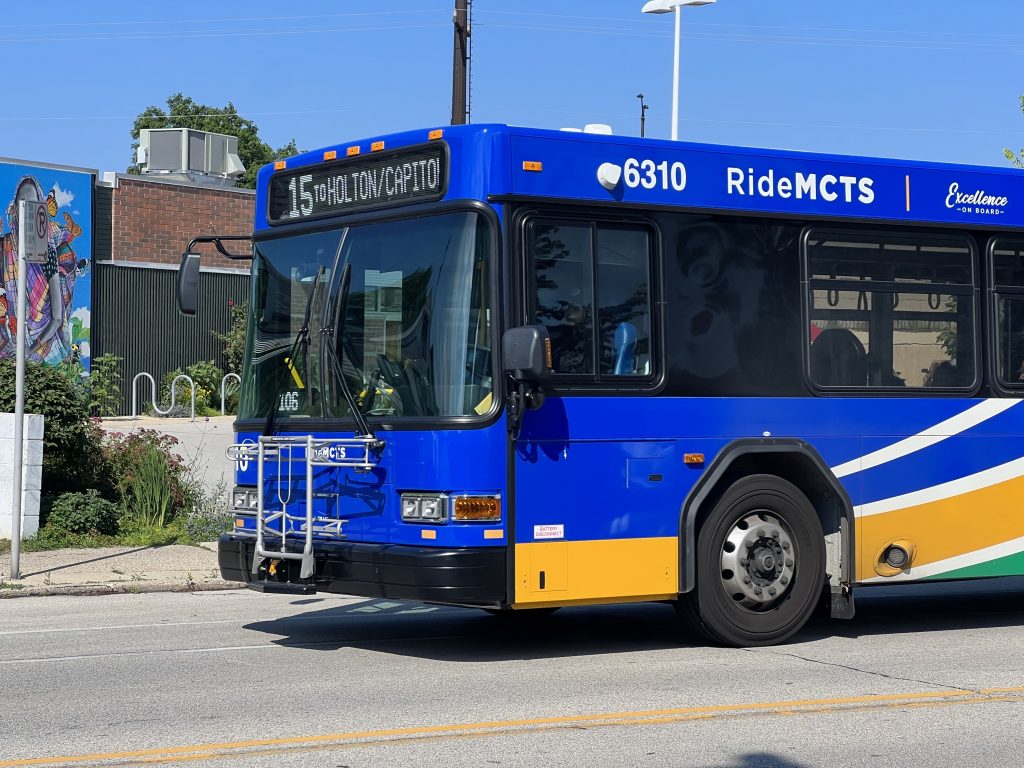Trump Administration Slashes Popular Transportation Grant Program by 90%, Imperiling Milwaukee Funding
Program previously funded several Milwaukee projects, including bridge repair, streets and streetcar extension.

MCTS bus. Photo by Jeramey Jannene.
A federal discretionary grant program for transportation infrastructure has been slashed to the bone and environmental justice and equity considerations have been eliminated. It could impact a recent $25 million award to the City of Milwaukee and significantly reduce the odds of Milwaukee County receiving an award to upgrade bus service.
Within days of President Donald Trump taking office, the U.S. Department of Transportation (USDOT) reduced funding for the program from $1.5 billion to $150 million and changed the application criteria to eliminate consideration of historically disadvantaged communities.
USDOT has also changed the name of the program from Rebuilding American Infrastructure with Sustainability and Equity (RAISE) to Better Utilizing Investments to Leverage Development (BUILD), which was its name under the prior Trump administration. The program was initially created in 2009 in response to the Great Recession and known as TIGER. Locally, the grant program has funded a streetcar extension to the lakefront, reconstruction of the Juneau Avenue bridge and is slated to fund the reconstruction of National Avenue and W. Villard Avenue.
An amendment to the notice of funding document from the USDOT shows the changes were made to align with executive orders signed by Trump shortly after he took office on Jan. 20. Including orders attempting to block further implementation of the Bipartisan Infrastructure Law and ending diversity, equity and inclusion policies. Every mention of the BIL in the updated documents has been edited to simply “infrastructure law.”
The Milwaukee County Transit System (MCTS) was planning to go after a maximum grant award of $25 million to make upgrades along the PurpleLine, which runs through the 27th Street corridor. In 2024, the transit system halted work on a new bus rapid transit project running through the corridor due to a lack of long-term funding. However, officials still wanted to invest in the corridor, which sees some of the highest ridership in the system.
“Milwaukee County has realized success in working with previous administrations to secure federal funding for investments in our community,” County Executive David Crowley said. “Unfortunately, this decision from the Trump administration may make it more challenging to compete for grant dollars aimed at supporting public transportation efforts. I look forward to working with Transportation Secretary Sean Duffy to invest in our infrastructure and provide safer, enhanced public transportation in Milwaukee County.”
MCTS filed its application for the grant on Wednesday. David Locher, MCTS enhanced transit manager, said staff worked through the weekend to update their application after the last-minute changes from the Trump administration.
“It’s a solid document that I think is going to be up to the competition,” he told Urban Milwaukee.
However, as he told supervisors on the county board’s Committee on Finance Thursday, it’s likely MCTS will be competing against thousands of agencies for a funding pool that has shrunk from $1.5 billion to $150 million.
“That does mean that if each agency maxes out at $25 million… only six will emerge as a winner this time,” Locher said.
Reducing the amount of congressionally-approved funding for a grant program by approximately 90% is “unprecedented, in my experience,” Locher told Urban Milwaukee.
When MCTS staff scrambled to update their application, they also had to toss out any consideration of “historically disadvantaged communities.” This metric asked transit agencies to collect data on areas where residents had less access to transit, where communities had poor health outcomes; where pollution is an issue; where there was poverty, as well as low educational attainment and low homeownership; where residents were vulnerable to the impacts of climate change; and where a greater share of residents do not speak English as a first language.
All of this data makes transit planners consider projects that are “very much in line with environmental justice and racial equity,” Locher said. “So what the amendment does is it basically engineers out the use of that data.”
The changes to the grant program were made before the Senate confirmed Duffy as the new transportation secretary. However, one of Duffy’s first actions as secretary was to issue an agency-wide memorandum telling staff to end the implementation of any Biden-era programs that reference “diversity, equity and inclusion” as well as “greenhouse gas emissions.”
Sup. Justin Bielinski, who sits on the board’s Committee on Transportation and Transit, was alarmed by the changes to the grant program.
“This certainly appears to be an example of key public transit infrastructure being jeopardized by a crusade against DEI,” Bielinski said. “Whether it’s legal or illegal, it’s detrimental to our communities.”
The updated grant document also shows USDOT officials attempting to cancel grant awards already made during the first round of funding in 2025, which includes Milwaukee’s National Avenue project. Officials edited the document to remove $500 million worth of grant funding, and eliminate projects in 13 states, the District of Columbia, Puerto Rico, American Samoa, Guam and the Northern Marianas Islands. The document does not provide a list of what states or projects were cut.
The changes also show the USDOT is excluding data from the U.S. Census Bureau Small Area Income Poverty Estimates (SAIPE) in its consideration of areas of persistent poverty, and will instead rely on the statutory definition of Areas of Persistent Poverty when evaluating project applications. The SAIPE estimates provide the most precise estimates of poverty for small communities, like counties, according to the census bureau.
A statement released by Duffy’s office Wednesday said the agency was rescinding “woke policies” and advancing Trump’s agenda.
“Today’s actions mark an important step in restoring commonsense governance and merit-based policies at USDOT,” he said of a handful of agency memoranda signed that day. “Under President Trump’s leadership, we are focused on eliminating excessive regulations that have hindered economic growth, increased costs for American families, and prioritized far-left agendas over practical solutions.”
If you think stories like this are important, become a member of Urban Milwaukee and help support real, independent journalism. Plus you get some cool added benefits.
Political Contributions Tracker
Displaying political contributions between people mentioned in this story. Learn more.
MKE County
-
Fellow Judge Testifies in Dugan Case
 Dec 16th, 2025 by Graham Kilmer
Dec 16th, 2025 by Graham Kilmer
-
Key Questions in Dugan Trial Take Shape on First Day
 Dec 15th, 2025 by Graham Kilmer
Dec 15th, 2025 by Graham Kilmer
-
FTA Tells Milwaukee to Crack Down on Fare Evasion — Even Where Fares Don’t Exist
 Dec 12th, 2025 by Graham Kilmer
Dec 12th, 2025 by Graham Kilmer
Transportation
-
Congestion Pricing Cuts Air Pollution in New York City
 Dec 14th, 2025 by Jeff Wood
Dec 14th, 2025 by Jeff Wood
-
FTA Tells Milwaukee to Crack Down on Fare Evasion — Even Where Fares Don’t Exist
 Dec 12th, 2025 by Graham Kilmer
Dec 12th, 2025 by Graham Kilmer
-
Will GOGO’s Bus Service Ever Get Going?
 Dec 9th, 2025 by Jeramey Jannene
Dec 9th, 2025 by Jeramey Jannene





















Any word on the 6th St project, or was that a different program?